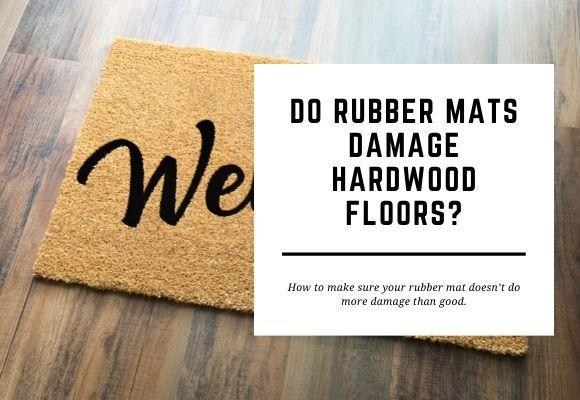
Do rubber mats damage hardwood floors?
How to make sure your rubber mat doesn’t do more damage than good.
Your beautiful new hardwood floors are installed, and they look fabulous. But, how do you keep them that way? If you have done your research, you know that a doormat is the easiest and most cost-effective method, but can any old mat do the trick?
This entire post would be pretty pointless if the answer was yes, so: no. You need to make sure your door mat is keeping your floors clean without creating a safety hazard or – god forbid – damaging your floors.
Rubber is by far the best material for a loose laid non slip mat, but some of our customers ask us if rubber will damage their floors. If you’re in a rush, the answer is no. But there is more to it than that.
So, do rubber mats damage hardwood floors? Let’s see…
Rubber won’t damage your hardwood floor
The natural friction of rubber mats means that do not need adhesive. The main benefit of this is that you can pick them up to clean, replace or hide as often as you like. Unlike mats that do require adhesive, the floor does not need to change to accommodate your mat.
The only damage that a rubber mat might do to your hardwood floor is leaving streaks. Some rubbers contain toxins that produce harmful fumes. Recycled rubber is the most common type to generate toxic fumes, but it depends on how the rubber is recycled.
As with any material, you get what you pay for with rubber. Cheap, low-quality rubber tends to smell worse, which is more damaging to your health and the environment. Cheap rubber is also the most likely to leave black streaks on your floor.
Rubber streaks can be easily removed with oil or a rubber cleaner, so we still recommend rubber mats for anyone that needs a non slip solution. Slip accidents can cause fractures and even death, so preventing them should be a priority in any home.
How to remove rubber scuff marks from hardwood floors
Most rubber scuff marks can be wiped away with your normal cleaning spray. Occasionally, though, you might see one that is more stubborn and need something a little stronger.
There are various ways to remove the tougher scuff marks from your floor, but our favourite is WD-40. Being in the flooring industry, we always have WD-40 lying around, but if you don’t, here are some alternatives:
Tennis ball
The surface of tennis balls has the perfect combination of rough – to remove dirt – and soft – to not damage the floor. To remove lighter scuff marks, gently rub the area with the tennis ball and watch it clump together in easy to remove balls.
Essential Oils
Essential oils like eucalyptus, lemon and tea tree oils are fantastic natural cleaning products. Mix a cup of water with 10 drops of your chosen flavour or combine your favourites for a great smelling rubber streak remover.
Vinegar
If you do not have essential oils on hand, try using vinegar instead. Mix a quarter cup of white vinegar with a quarter cup of water and use a sponge or that tennis ball from earlier to gently rub the streaks away.
Baking Soda
Baking soda mixed with water creates a DIY paste that is great for cleaning scuff marks. You can buy specific cleaning baking soda but, to be honest, the box you have in your baking cupboard will do just fine.
When might rubber mark your hardwood floors?
Your rubber mat is unlikely to mark your hardwood floor, but some factors make it more likely. Mats made solely of rubber are more likely to mark than those with rubber backing on an alternative material, for example.
To get the most benefit out of your doormat, choose a mat with an absorbent surface that will keep your floors clean and dry. All our rubber-backed indoor mats are made from the highest quality natural rubber, so they won’t smell bad or leave excessive streaks.
It is also worth noting that some types of hardwood flooring may have a chemical reaction with rubber. In this instance, a rubber mat may damage your floor. Speak to your flooring provider to find out if any materials do not react well with your floors.
Just because your floor is hard and wooden, it does not mean it is a hardwood floor. It probably is, but some people do decide to use softwoods for their floors, which are much more likely to be damaged by rubber mats.
So, check with your floor layers to be sure. This goes for any flooring, no matter what type of matting you plan to use on top.
Is a rubber mat a good choice for your hardwood floor?
If you have just installed hardwood flooring, or even if you have had it for a while, you probably don’t want to take the risk of something that might damage your floor. To be on the safe side, invest in a mat with a good quality rubber backing.
As we said, you get what you pay for with rubber. Saving a few hundred dollars now might end up costing you thousands in the future. Always invest in high-quality matting to get the longest life and the best performance out of it.
To work out if rubber mats are a good choice for your home or office, get in touch with the team. Our matxperts know mats better than anyone, so they can help recommend the perfect products for your floor type. Call us on 1300 628 746 or use the chat below.
For information about using rubber matting in an office environment specifically, check out this article on the disadvantages of rubber office mats.

